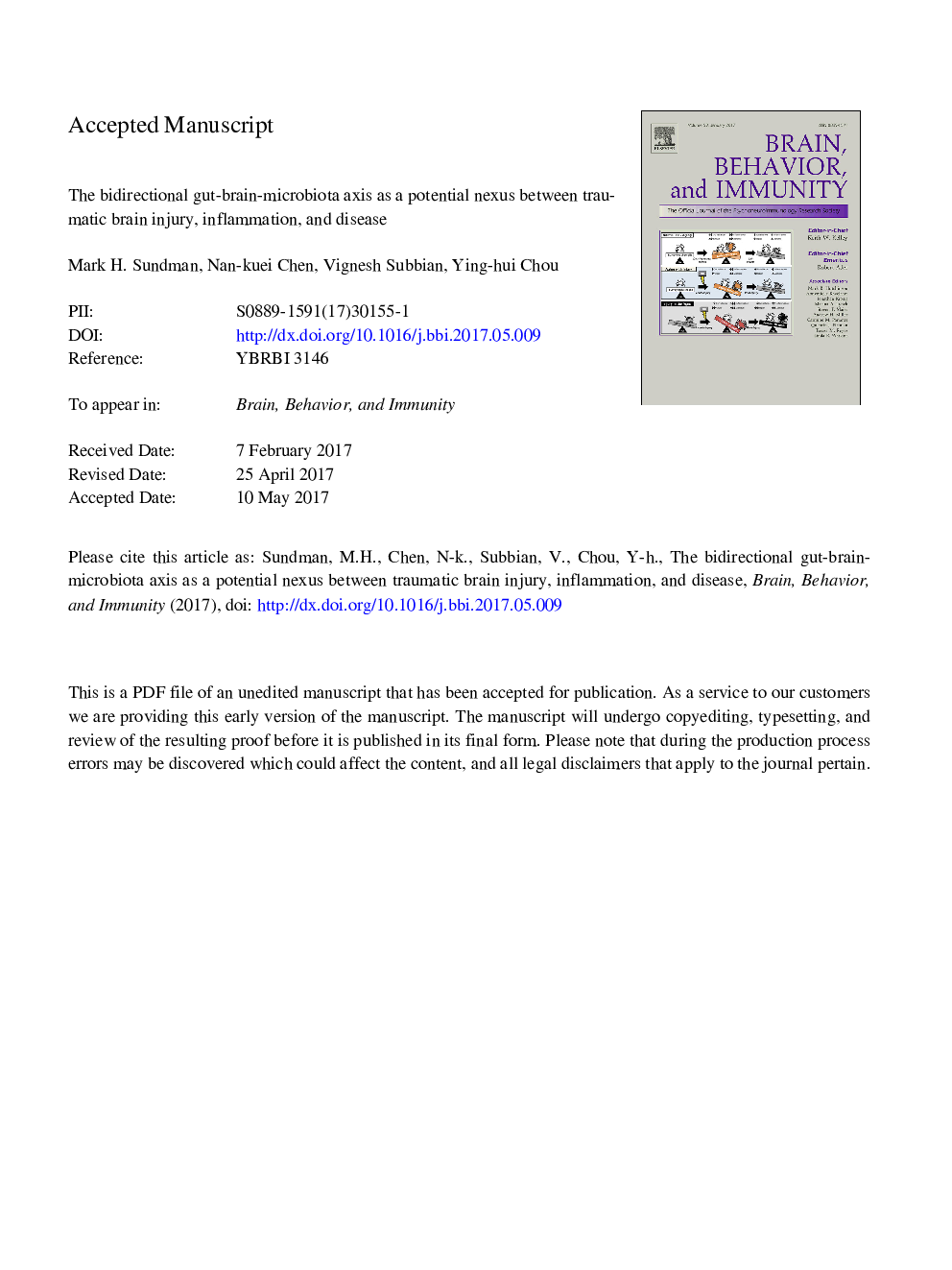| کد مقاله | کد نشریه | سال انتشار | مقاله انگلیسی | نسخه تمام متن |
|---|---|---|---|---|
| 7279741 | 1473900 | 2017 | 49 صفحه PDF | دانلود رایگان |
عنوان انگلیسی مقاله ISI
The bidirectional gut-brain-microbiota axis as a potential nexus between traumatic brain injury, inflammation, and disease
ترجمه فارسی عنوان
محور دو طرفه مغز - مغز - میکروبی به عنوان یک ارتباط احتمالی بین آسیب مغزی آسیب دیده، التهاب و بیماری
دانلود مقاله + سفارش ترجمه
دانلود مقاله ISI انگلیسی
رایگان برای ایرانیان
کلمات کلیدی
محور روده مغز، آسیب تروماتیک مغز، تکان دهنده، خلط، میکروبیوتا، انسفالوپاتی ترومای مزمن، بیماری نوروژنیک، عصب خونی میکروگلایا، اختلال روده،
Traumatic brain injury - آسیب تروماتیک مغزIntestinal dysfunction - اختلال رودهNeuroinflammation - التهاب عصبیchronic traumatic encephalopathy - انسفالوپاتی مزمن ترومایتیNeurodegenerative disease - بیماری های نوروژنیکConcussion - تکان مغزیGut-brain axis - محور خوب مغزMicrobiota - میکروبیوتاMicroglia - میکروگلیاهاGut - گل سرخ
موضوعات مرتبط
علوم زیستی و بیوفناوری
ایمنی شناسی و میکروب شناسی
ایمونولوژی
چکیده انگلیسی
As head injuries and their sequelae have become an increasingly salient matter of public health, experts in the field have made great progress elucidating the biological processes occurring within the brain at the moment of injury and throughout the recovery thereafter. Given the extraordinary rate at which our collective knowledge of neurotrauma has grown, new insights may be revealed by examining the existing literature across disciplines with a new perspective. This article will aim to expand the scope of this rapidly evolving field of research beyond the confines of the central nervous system (CNS). Specifically, we will examine the extent to which the bidirectional influence of the gut-brain axis modulates the complex biological processes occurring at the time of traumatic brain injury (TBI) and over the days, months, and years that follow. In addition to local enteric signals originating in the gut, it is well accepted that gastrointestinal (GI) physiology is highly regulated by innervation from the CNS. Conversely, emerging data suggests that the function and health of the CNS is modulated by the interaction between 1) neurotransmitters, immune signaling, hormones, and neuropeptides produced in the gut, 2) the composition of the gut microbiota, and 3) integrity of the intestinal wall serving as a barrier to the external environment. Specific to TBI, existing pre-clinical data indicates that head injuries can cause structural and functional damage to the GI tract, but research directly investigating the neuronal consequences of this intestinal damage is lacking. Despite this void, the proposed mechanisms emanating from a damaged gut are closely implicated in the inflammatory processes known to promote neuropathology in the brain following TBI, which suggests the gut-brain axis may be a therapeutic target to reduce the risk of Chronic Traumatic Encephalopathy and other neurodegenerative diseases following TBI. To better appreciate how various peripheral influences are implicated in the health of the CNS following TBI, this paper will also review the secondary biological injury mechanisms and the dynamic pathophysiological response to neurotrauma. Together, this review article will attempt to connect the dots to reveal novel insights into the bidirectional influence of the gut-brain axis and propose a conceptual model relevant to the recovery from TBI and subsequent risk for future neurological conditions.
ناشر
Database: Elsevier - ScienceDirect (ساینس دایرکت)
Journal: Brain, Behavior, and Immunity - Volume 66, November 2017, Pages 31-44
Journal: Brain, Behavior, and Immunity - Volume 66, November 2017, Pages 31-44
نویسندگان
Mark H. Sundman, Nan-kuei Chen, Vignesh Subbian, Ying-hui Chou,
